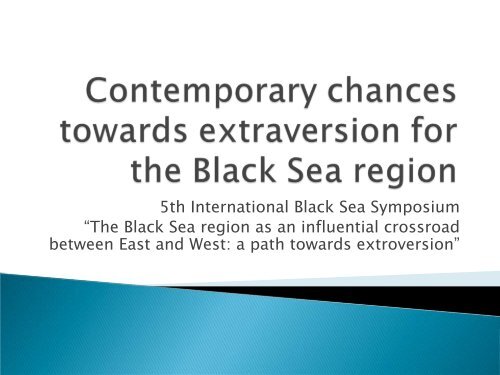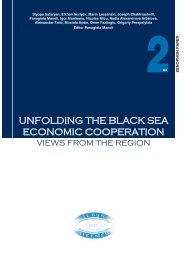Ms. Sofia Saridi - ICBSS
Ms. Sofia Saridi - ICBSS
Ms. Sofia Saridi - ICBSS
You also want an ePaper? Increase the reach of your titles
YUMPU automatically turns print PDFs into web optimized ePapers that Google loves.
Today’s globalised environment is the increasing visibility andrelevance of regional arrangements. It is evident that many of thefactors that fuel globalization are also at work at the regionallevel. These elements include an enhanced sense of interdependenceamong nations and peoples, the ease and intensityof the means of transport and communication, and the extentand complexity of economic interactions.The conditions of proximity, manifested in shared strategic andeconomic concerns, very often accompanied by related historicaland cultural backgrounds. In response, regional diplomacy takeson a dual direction. On the one hand, it is an inward directedprocess permitting consultation and cooperation among a groupof neighboring states on issues of shared concern. On the otherhand, it is an outward directed process permitting a group ofneighboring states to adopt common positions and objectives ininter-actions at the global level.
In most regions, several cooperation initiatives proceed inparallel, sometimes related to each other, but very oftenindependent of each other. Do plentiful and overlappinginitiatives enhance the promotion of security and cooperation ina region or do they rather disperse resources and efforts?Several regional initiatives sometimes create confusion, and even fromEU professionals of each country it is not easy to describe to the publicthe role of each initiatives and regional bodies. On first view it looks thatfrom states point of view it is sometimes very expensive andunnecessarily, but long term effect.
Situated at the crossroads of Europe and Asia,the Black Sea has been a zone of contention andconfrontation for centuries. From antiquity, theregion was traditionally the backyard of one ortwo powers, which dominated and closed it tothe outside world. During the Cold War, it found itself on thefrontline of the global struggle for dominance. In the last two decades the Black Sea haschanged beyond recognition. Its strategiclocation, between the reserves of the Caspianbasin and Europe, places the Black Sea in aunique position.
The end of the Cold War changed beyond recognition the geopoliticalposition of the Black Sea. The demise of communism unleashed armedconflicts and pent up historical tensions. The most sensible way to overcomethe economic and security vacuum left in its wake.For them, participation in regional cooperation schemes was regarded as astep towards integration into broader global economic, social and politicalsystems. There was a widespread belief that these groupings and initiatives,through the adoption of confidence-building measures, could contribute togeopolitical stability by facilitating collaborative action against the rise ofnew threats.
Even in 2000 until the onset of the worldeconomic crisis, the region had one of thefastest rates of growth in the world. Tradebetween countries of the region is also on therise. Because of undergone fundamental changesin terms of economic development has nowsecured a place on the global economicagenda.
There is thus a need to clarify the Union’s s statuswith regard to the formulation of regionalpolicies and outputs. The region’s s future lies in furtherdemocratization and economic integration withthe wider world. It also needs an enhanced senseof security, strengthened political stability,sustained efforts to solve its protracted conflictsand the renunciation of the use of force for theirsettlement.
Considering that about half of the countries in theregion have had little experience of sovereignstatehood, the political transformations of the pasttwo decades have been impressive.Progress towards the establishment and properfunctioning of democratic institutions and the rule oflaw has proved uneven and been marked byoccasional setbacks and reversals.The tendency among some of the region’s s post-Soviet states to drift towards authoritarianism andrestrictive economic policies, coupled with thechallenges raised by separatistMovements and inter-state disputes have inhibitedthe promotion of cooperative attitudes.
The states in question should be encouragedto seek regional solutions for regionalproblems and the Black Sea already possessesthe institutional wherewithal to address itschallenges directly. However stakeholders must face up to theneed to tackle tasks together and allow fornon-state actors such as the business sector,NGOs and civil society to play a real role inshaping solutions.
20th anniversary of BSEC is an opportunity torenew the commitment of its members toregional cooperation and to inaugurate anoverhauled BSEC in order to make it a morerelevant organization.
The establishment of BSEC has been termed asuccess in itself, since it represents acooperative organization in a regionotherwise divided by conflicts and tension.An important advantage of BSEC is that it hasbeen formed and developed by the Black Seastates themselves and includes all statesaround the Black Sea, thus enjoying a highdegree of political legitimacy.
BSEC has in several ways proven a problematic venuefor cooperation around the Black Sea. Theconsiderably lower level of economic exchangesbetween the Black Sea littoral states has oftenprovided for questioning BSEC’s progress regardingits main objective. The amount of funds allocated to BSEC’s budget onthe part of its member states does not indicate thatcooperation in this form is highly prioritized and itremains unclear to which extent the member statesare willing to grant BSEC room for initiative.Moreover, members’ priorities concerning Black Seacooperation within the framework of BSEC are unclear.
The inclusive nature of BSEC is linked to itscomprehensive Institutional structures whichassure a focus on relevant thematic issues.Although it avoids addressing security issues assuch, it should be noted that these are dealt within the context of its parliamentary assembly andits related research centre. A serious issue that needs consideration is thetop-down, strictly intergovernmental nature ofthe organization and the inability orunwillingness of its stakeholders to give it anyautonomy or open it up to the initiatives of civilsociety or the business community.
We must recognize the reality of a revolutionized medialandscape in which letting others have their say is justas important as getting your own point across.Megaphone diplomacy does not breed trust anddictating the conversation will go nowhere.If you can inform the conversation around the subjectsthat matter to you - becoming an active participantwithin that conversation and accepting the dispersal ofauthority - you will help re-build trust, particularly trustin yourself and your argument, and this will ultimatelyserve the objectives
Public diplomacy has generally beenconsidered a function of states. Yet we seethat a wide range of activities are undertakenand huge sums are spent on press relationsand communications by internationalorganizations. Is this public diplomacy?
The target for such efforts must be either their own publics, orthe government and opinion-formers of non-member states, orboth.To ensure a positive perception of their activities among opinionformers, the media, and members of the public who willconsequently support continued involvement by their governmentsin the organization’s activities. This will involve persuading theiraudiences that the activities they undertake are relevant and yieldpositive benefits.
As a regional organization could explore the potential for using lowcosttechnology, and developing partnerships with non-state actors.Identifying issues which will resonate with the public and exploringopportunities to partner with other regional organizations inmaximizing outreach could be one avenue.Exploiting the potential of special events, such as anniversariesor one-off events related to sports or culture or internationalconferences, should be considered. But developing effective PDstrategies requires understanding and commitment not onlywithin the organization but from all the member states whoshould be aware of the importance of allocating sufficientresources.
BSEC must be clear and unanimous about itsgoals and the message it wants to convey.Organization secretariats should embrace newtechnology and imaginative methods ofspreading their messages, identify ways toaccommodate the circumstances of themembership. All member states should promote the objectivesand values of the organization in question andshould play their part by providing the necessaryfinancial resources, expertise, information, andtechnology to allow the staff to project the rightimage and message.
It is clear that public diplomacy in BSEC’s s case poses its ownchallenges because of the split responsibility between differentinstitutions and member states and the particular difficultieswhere the views of member states diverge.But there seems to be a consensus that, in general, BSEC shouldundertake public diplomacy activities to educate the public aboutthe BSEC’s s goals and activities; to persuade the public to supportthe organization and their government's commitment to it; tosupport fund-raising activities; to offer accountability to publictaxpayers for their governments' financial commitments.Outreach is particularly important in regions where the BSEC’s s isnot well-known or where perceptions are negative or outdated.This last point applies equally to the populations of states whichare members of the organizations and to those in non-membercountries.
Consistency of messaging is essential both withinthe organization and between the organizationand its member states to establish and maintaincredibility. Establishing a good relationship with influentialmedia and other non-state bodies, eg NGOs,academic institutions, can help both for longer-term PD efforts and with crisis management. More effort should be taken to advertise successstories and to publicize little-known activitieswhich can build positive perceptions.
Youth should be a serious focus.BSEC should look for youth-friendly means to disseminatetheir message which will attract attention, perhaps inpartnership with educational institutions or other NSAs, forexample cultural ,student –youth & sports organizations.The use of celebrities to attract public attention in termsof raising public awareness and fund-raising is on thewhole viewed as a success.Using social media and other modern ICT tools is essentialto capture attention given that this is the preferredmedium for many young people.BSEC should use whatever methods might be mostappropriate to their audience, which may in some casesmean more traditional means of communication.
Let's start from ourselves Let ‘s be moreinterested about Black Sea"We must be the change we wish to see in theRegion"









